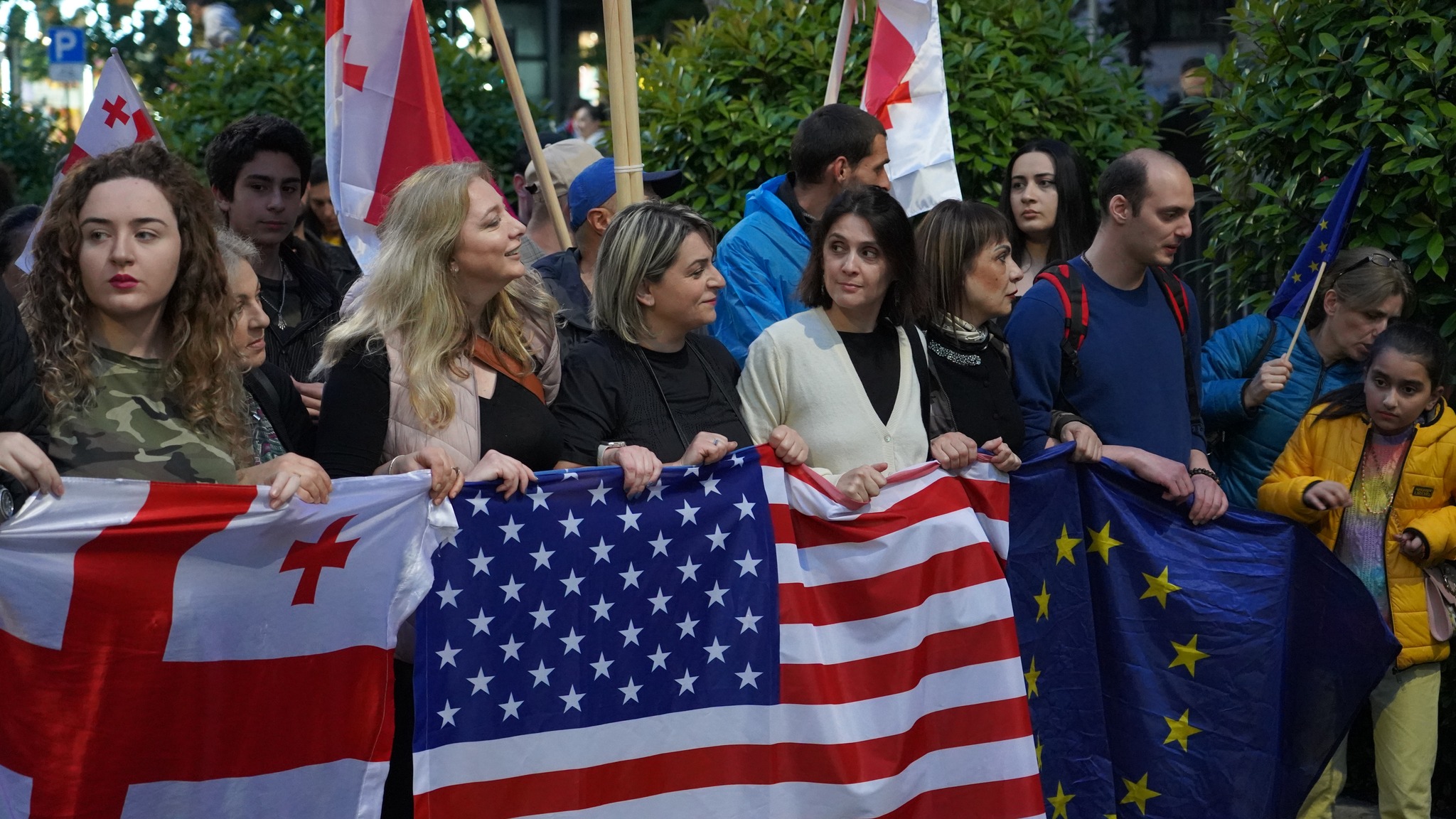
To Stall Democratic Decline in Georgia
The erosion of Georgian democracy has intensified from a quiet rumbling to a roaring landslide in recent weeks, dragging the small republic’s relationship with the United States down with it. As Washington prepares foreign policy triage, it should prioritize enabling the Georgian people over punishing their unruly illiberal government.
Most importantly, Congress must convince both Georgia’s Euro-aspirant public and Euro-skeptic elites that its promises are credible. Anything else risks total diplomatic collapse — as a young researcher on the ground in Tbilisi, I have watched Georgia’s geopolitical isolation corrode its commitments and complicate otherwise easy decisions.
As the ruling Georgian Dream party has again spearheaded a Kremlin-style “foreign agent” bill that restricts media and NGOs, the optimistic hype for Georgia’s European Union membership candidacy has nearly dried up. The EU has made clear that the bill will tank Georgia’s constitutionally enshrined EU hopes. The government’s critics argue that this self-sabotage of Georgia’s Western integration is its explicit goal. Strolling the perimeter of the massive protests that have filled the streets near Parliament in recent weeks, I have drawn awe from the Georgian commitment to safeguarding civic space, a freedom we Americans often overlook.
The derailment of Georgia’s EU ambitions bled into its relations with the United States when ruling elites stoked fears of a Western “global war party.” Weeks later, U.S. Secretary of State Antony Blinken announced a startling “comprehensive review” of the U.S.-Georgia relationship.
Washington’s stake in Georgia extends beyond notions of global democracy. Not only does Georgia cooperate closely with U.S. military objectives, but it lies along crucial energy pipelines. And perhaps most significantly, Georgia — which Russia invaded in 2008 and still occupies — has long endured Russian military aggression. For the U.S. to turn its back on the Georgian people would implicitly enable Russian irredentism in Ukraine, Moldova, and elsewhere.
At present, Washington may prioritize one of two routes: inflict maximum discomfort upon the illiberal Georgian ruling coalition, or offer tempting inducements conditional on the withdrawal of repressive legislation.
The aggressive option, currently favored in Washington, means focusing efforts on a targeted sanctions program against key members of the Georgian ruling coalition, including Bidzina Ivanishvili, the billionaire former Prime Minister widely known to rule from the shadows. Sanction measures include asset freezes and visa bans for political elites and security forces.
So far, U.S. officials have prioritized the sanctions-first route. On May 24 Secretary Blinken announced a visa restriction policy for those “responsible for or complicit” in undermining Georgian democracy. Similarly, the Georgian People’s Act (GPA), which senators Jeanne Shaheen (D-NH) and Jim Risch (R-ID) introduced on May 23, introduces a series of deserved punitive measures for illiberal Georgian rulers. The bill represents an important American stand against Georgian autocracy, but its punishing approach may undermine long-term objectives.
The trouble with a sanctions-led approach is twofold: Not only do sanctions appear set for meager impact, but they feed the anti-Western narrative that paints the U.S. as an illegitimate enforcer of arbitrary foreign policy objectives. Georgian Dream politicians have quickly dismissed the effectiveness of U.S. sanctions threats: In one extreme example, MP Lado Kakhadze declared, “Only God can sanction me.” Meanwhile, others have branded sanctions programs as an imperial tool; Parliament Speaker Shalva Papuashvili flipped the script and accused the U.S. of “Russian methods.”
That is, this policy approach creates a catch-22 for U.S. interests. Punitive American sanctions are designed to keep the Georgian Dream from veering too far from the Euro-aspirant path. But those same sanctions reduce the benefits of a continued Georgia-U.S. relationship, and thereby reduce the costs of rapprochement with Russia.
The preferable, less aggressive tool creates a set of conditional carrots for the Georgian Dream to vacate their anti-democratic agenda. These incentives, like enhanced trade relations, visa liberalization, and security assistance, serve the interests of the Georgian people and ruling elite in tandem.
To be clear, Georgian leaders have not celebrated conditional inducements either. Nor must the U.S. approach eschew sanctions completely. But leaders in Washington should avoid aggressive rhetoric and instead emphasize the potential utility of their promises.
A promise-first policy not only insulates Washington against disingenuous name-calling, but fuels the pro-Western opposition by giving civilian organizers tangible objectives. Conditional visa liberalization might be the difference-maker in a young Georgian student’s decision to march to Parliament or stay home; when fighting a diffuse, ill-defined enemy like the restriction of civic space, clear benchmarks matter. And since pro-Western power currently lies “in the streets,” as Georgia expert and Harvard Professor Stephen Jones observed, these inducements spur the movement where it counts.
Still, effective inducements require credible promises. The leading Georgian Dream criticism of potential inducement programs concerns uncertainty, both in terms of defining conditions and — critically — passing into law. U.S. Representative Joe Wilson’s MEGOBARI Act, introduced separately from the GPA on May 23, leaves the executive branch to define “sustained progress towards reinvigorating [Georgia’s] democracy,” a subjective milestone. Indeed, similar past legislative attempts failed to attain the power of law.
Therefore, Congress must forgo fighting language, prioritizing inducements instead. Congress must tie these promises exclusively to a narrow trigger, namely the retraction of the “foreign agent” law, without subjective benchmarks thereafter.
And Congress must act quickly, lest Georgia’s budding rapprochement with Russia morph into a full-blown realignment that robs its people of the future they desire.
